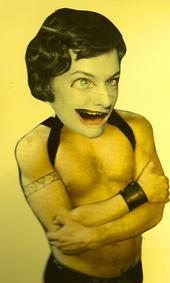Fassbinder’s penultimate film, “Die Sehnsucht der Veronika Voss” (“The Longing of Veronika Voss”) being it’s German title, occupies the middle section of what has come to be known as “The BRD Trilogy”, three films made during the latter part of his career, each focussed on a female lead character trying to make her way in the early years of the new post-war German republic. Each is also a kind of tribute to one of his own favourite films: “The Marriage of Maria Braun”(1978) has been identified as having parallels with “Mildred Pierce”; Barbara Sukowa as “Lola” is a recognisable homage to Marlene Dietrich’s “Blue Angel”; and “Veronika Voss” is strongly reminiscent of Billy Wilder’s “Sunset Boulevard” in that it charts the decline of a washed-up screen star who proves dangerously fascinating to a younger man. However, Fassbinder’s model for his character has also been identified as being Sybille Schmitz, a highly successful actress in Germany during the 1930s and 1940s who, in turn, became a favourite of Joseph Goebbels. Like Voss, Schmitz found that there was no place for her in post-Nazi Germany and, her career over, she committed suicide in 1955 through an overdose of sleeping tablets, although a year later legal action was taken against her doctor for improper medical treatment. Read on and you will see striking similarities!

The film, set in 1950s Munich, begins in a cinema with Voss (Rosel Zech) watching one of her old films in which her character, a movie star no less, desperately signs away her life and belongings for a hit of the drugs to which she is so obviously cripplingly addicted, this as we see actually being a mirror image of what has become of Fassbinder’s heroine in “real life”. Interestingly, watching the film over her shoulder with great concentration is the director himself, making a Hitchcock-style cameo appearance, the irony being that his life would soon be cut short, too, as a result of the drugs on which he had become increasingly dependent. Anyway, Veronika can only take so much of her former glory and storms out of the cinema in tears. Then, as she stands crying in the rain, a man takes pity and offers her shelter under his umbrella and so begins the film in earnest.

The man, we find out, is Robert Krohm, a sports reporter who soon falls under her spell, both sexually and as a journalist wanting to unravel the mystery that her life has become. Having alighted from the tram and run into the premises of Dr. Marianne Katz, “Nervenärztin” (a lady doctor for the nerves), he is clearly on her mind, too, and in the next scene we see him and his girlfriend being woken in the middle of the night by a phone call from her, inviting him to tea later that day so that she can reward his gallantry. During this, their first rendezvous proper and where it becomes apparent that she is deluding herself that her star quality and fame are still what they were in prior decades, she borrows 300 Marks from him so that she can run off and buy a brooch she says she has seen at a kiosk downstairs from their table. Having just got him to admit that he finds her very beautiful and procured the money, she exclaims “When I see something, I have to have it.” The brooch, by the way, gets returned for a cash refund once Robert has left the restaurant.
Robert, having undertaken a bit of background research, then seeks out Veronika in pursuit of his 300 marks and traces her to Dr. Katz’s clinic where she lives, signing away what remains of her fortune for the opiates she now needs to survive. As he gains admittance and enters, we see that the place has an otherworldly glow of pure whiteness (the film is shot in black and white, anyway) suggestive both of the powder she must have regularly administered and the afterlife into which she has effectively already passed. It soon turns out that Dr. Katz sees wealthy clients privately for their depression, writing out false prescriptions to which they will become addicted and through which she can bleed them dry of all they possess. The elderly Jewish couple, survivors of Treblinka, whom he meets on this first visit to Katz, are also suffering a similar predicament, their antique business slowly being sucked away from them by their slavery to their addiction. Veronika has been gagged behind the scenes for the duration of Robert’s meeting with the doctor and gets a real dressing down once he has left. “Whenever you need something, you should ask me. Understood?” she “reassures” her client in a sinister and threatening manner.


Part film noir, part Hollywood melodrama, “Veronika Voss” is a delight to the eyes from start to finish and epitomises a degree of sophistication which Fassbinder achieved in the later stages of his career in the BRD Trilogy films, the epic television adaptation of Döblin’s “Berlin Alexanderplatz” and the colour saturated fantasy of “Querelle”. It’s no wonder he finally achieved the recognition after which he so hankered at the 1982 Berlin Film Festival. However, the bite of early Fassbinder films is still there, too, as “Veronika Voss”, like its sister films, is a searing critique of the post-war German miracle in which not all Germans fared as well as others and in which a sort of historical amnesia was necessary in order to move forwards. Veronika Voss, who rode the crest of the wave of the Nazi era, and the Jewish couple, who represent the other side of the coin but who also end up committing suicide when their supply dries up, all end up in the same desperate boat in the new, improved republic where, it seems, a new set of tyrants now inflict a less conspicuous brutality upon the weak than that doled out by their predecessors.


No comments:
Post a Comment